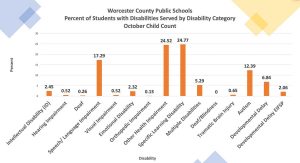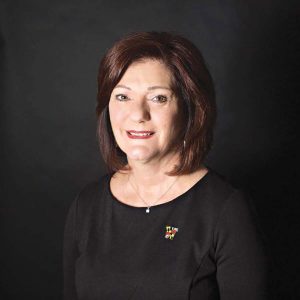By Ally Lanasa, Staff Writer

PHOTO COURTESY WORCESTER COUNTY BOARD OF EDUCATION
A new special education teacher at Pocomoke High School and an additional speech pathologist will help meet the needs of Worcester County Public School students with disabilities, Supervisor of Special Education Rae Record said during the Worcester County Board of Education meeting on Tuesday, July 14.
(July 23, 2020) The Worcester County Board of Education on July 14 addressed changes to the school system’s special education staff for the 2020-21 school year, including a new teacher at Pocomoke High School and an additional speech pathologist for elementary schools.
Supervisor of Special Education Rae Record, who presented the annual staffing report, said staffing is constantly evaluated based on the needs of students to be provided a free, appropriate public education.
“When we have a plan for staffing, it isn’t about numbers, it’s about need,” Record said.
According to the October child count, 12.39 percent of students with disabilities served by the disability category in Worcester County Public Schools were identified with autism.
“Students that are identified with autism sometimes have a cognitive disability, so they will need specialized instruction,” Record said. “[Some] have a communication disability, so those students will need speech and language therapy, and students with autism usually have some kind of a sensory perception disability, which will require occupational therapy.”
Over 80 percent of students with disabilities in Worcester County Public Schools spend more than 80 percent of their day inside the general education classroom.
Although most students with disabilities are in full inclusion in general education, the school system provides services inside and outside the classroom to meet the needs of all students, Record said.
“At the end of that continuum, where students need more services and a more restrictive environment, we have our special school,” she added.
County public schools offer programs for people with disabilities, starting at birth.
The infants and toddlers’ program serves children up to 3 years old in their natural environment.
“We also have itinerant [services], which means that sometimes the parent may bring a child into an elementary school to receive speech or occupational therapy, just depending on the need,” Record said.
Services are also provided for that age group at Head Start, childcare centers and nursery schools.
Staffing for the infants and toddlers’ program consists of two speech therapists, an occupational therapist, a physical therapist, a home educator, a case manager, a teacher of the vision and hearing impaired, an assistive technology teacher and a behavioral coach.
Early childhood intervention services for children with disabilities aged 3 to 5 include an inclusive 3-year-old program, an inclusive prekindergarten and an inclusive kindergarten within the general education classroom.
In addition, the Worcester County Public Schools provide special education services from grades first through 12th.
“We have a High Road Program for students who have more intensive behavioral needs,” Record said.
Other programs for older students are the Community Work Experience Transition Program and the Tri-County Wor-Wic Project for high school students between 18 and 21 years old.
Record said there is nonpublic school placement as well if necessary.
“We usually have very few students in nonpublic because we are able to provide the services within Worcester County,” Record added. “Our goal is to narrow the gap for students with disabilities, and we do that by providing services in the natural setting.”

Rae Record
Generally, there are special education teachers per grade level in grades prekindergarten through fifth in most schools as well as in each core content area at the secondary education level.
“Then, of course, related services are provided as indicated in the student’s [individualized education program] IEP,” Record said.
Relative service providers are speech therapists, occupational therapists and physical therapists.
Special service providers vary by need such as, transition facilitator, audiologist, school psychologists, behavior intervention teacher and assistive technology teacher.
The special education staffing plan is determined by obtaining public input, collaborating with building level administration on staffing needs, monitoring the service currently provided and needs of the students and monitoring caseloads of case managers and service providers.
This upcoming school year, a new special education teacher at Pocomoke High School will help with the intense need of students there and an additional
will help elementary schools with a high volume of students with autism that require speech services, Record said.
